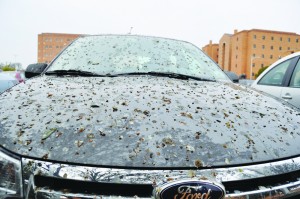
Birds have been wreaking havoc on sophomore Karen McClain’s campus life all week.
It’s also costing her money.
“I’ve gotten my car washed three times this week,” McClain said. “When I go to my car after class, it is covered in white. This isn’t like Angry Birds. It’s beginning to become a problem.”
Students like McClain have seen no shortage of feathered “friends” over the last few months.
The birds are usually known to fly north this time of year, but Dr. Frederick Stangl, MSU biology professor, said the mild winter might be the reason for the increasing amount of birds students have seen flocking on campus.
“As with other places, we have pronounced seasonal differences, regardless of weather severity, in the types and numbers of birds as some of our birds fly south for the winter, others from up north winter down here,” Stangl said.
Some prominent changes during winter months are the visiting sharp-shinned and Cooper’s hawks in town from up north, he said.
“Some resident bird species that are more noticeable when they flock together at this time, such as starlings, blackbirds and grackles,” Stangl said. “Then
there are the pigeons, that have exploded locally in the past few decades and I don’t think anyone knows exactly why.”
From hummingbirds to snowy owls, there are about 350 species of birds that have been recorded from north-central Texas.
Stangl said most of those have probably occurred in the Wichita Falls area at one time or another, even if only as occasional, or rare and accidental visitors.
There is nothing special about MSU that lures birds to campus, he said.
“We have the lake as a magnet for overwintering migratory ducks, coots, cormorants, and seagulls,” Stangl said. “Maybe the biggest nuisance is the influx in recent years throughout Texas and elsewhere of Canada geese, more of which have decided to settle and breed, many as year-long residents.”
Stangl said as long as there are water and trees, there will have birds.
“I think everyone is a bit of a birdwatcher,” Stangl said. “Most people appreciate birds as an interesting group and consider these situations as minor and transient irritations.”
McClain has hopes that Midwestern will do something about the birds. But Stangl said to eliminate the birds in a safe and animal friendly way may cost big money.
“Different birds require different strategies,” Stangl said. “Everything from shooting off canons, using chase dogs to eliminating roosting areas and most are also federally protected. This will always remain a problem to wrestle with.”
Another consideration is that any problem birds displaced are to quickly become someone else’s problem, Stangl said.
















